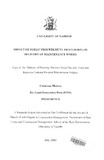| dc.contributor.author | Mutava, Catherine | |
| dc.date.accessioned | 2013-02-26T07:59:55Z | |
| dc.date.available | 2013-02-26T07:59:55Z | |
| dc.date.issued | 2012 | |
| dc.identifier.uri | http://erepository.uonbi.ac.ke:8080/xmlui/handle/123456789/11347 | |
| dc.description.abstract | The public procurement system in Kenya has been undergoing reforms consistent with the global trend since the mid 1990s, most notably within the periods covering 1997-2001 and 2005. The delivery of maintenance projects in Kenya is highly dependent on the efficacy and efficiency of the public procurement and tendering procedures .The procurement procedure leading to tender awards is too long depending on the choice of procurement method which cannot arrest an emergency. Maintenance has very unique characteristics especially for corrective maintenance which is never planned and yet it is an emergency which is supposed to be addressed as it occurs. This is one of the many challenges faced by Public Institutions posed by Public Procurement and Disposal Act (PPDA). In addition equipment failure can create safety hazards, costly downtime while waiting for parts, and increased costs due to the associated disruptions. If parts are hard to find, out of service times can be greatly increased.
The intent of this research was to evaluate the challenges posed by PPDA on procurement for emergencies or unplanned maintenance in Kenya. It explored the effects of the PPDA on the delivery of unplanned maintenance projects; the challenges faced while carrying out public maintenance projects as wel1 as determine the best and most suitable procurement and tendering system for emergencies. The hypothesis was Public procurement and tendering procedures have no effect on delivery and maintenance of projects. Data was collected using questionnaires and structured interview schedule administered some via face to face survey method and others mailed to a sample of 40 procurement and maintenance officers.
The findings indicate that the Public Procurement and Disposal Act affect Public Procurement and tendering of corrective maintenance projects in the public institutions. The major challenges being delays in terms of time due to a lot of documentation required, cost overruns and compromised quality of works. Thus approving the alternate and disapproving the null hypothesis. The study therefore concludes that PPDA to be reviewed to make it more inclusive and responsive to the requirements of procurement for emergencies. The government should ensure the existing legislative framework and regulations are enjoined with monitoring and evaluation framework which would be crucial in successful implementation of PPDA. A vote for emergency response should also be set aside because with restrictions imposed by the PPDA most of the prequalified contractors are not always ready to provide the services within a short notice owing to liquidity problems. | en_US |
| dc.language.iso | en_US | en_US |
| dc.publisher | University of Nairobi, Kenya | en_US |
| dc.title | Impact of public procurement procedures on delivery of maintenance works: Case of The Ministry of Housing, National Social Security Fund and
Kenyatta National Hospital Maintenance Projects | en_US |
| dc.title.alternative | Thesis (MA) | en_US |
| dc.type | Thesis | en_US |

